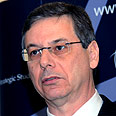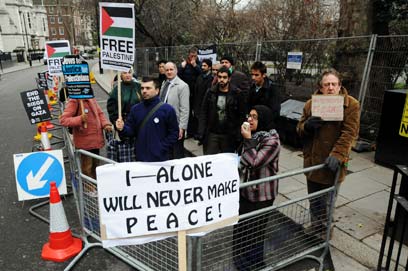
UK assures Ayalon he won't be arrested
Deputy foreign minister addresses International Institute for Strategic Studies in London on Mideast issues. He attempts to ease tensions with Syria, says Israel will maintain good relations with Turkey, but 'will react to dangerous rhetoric emanating from our neighbors'
During the visit, Ayalon was expected to discuss the issue with senior British officials, who have expressed their desire to change the kingdom's arrest procedures following the warrant issued against Opposition Chairwoman Tzipi Livni in December.
The deputy foreign minister addressed the International Institute for Strategic Studies (IISS) in London on issues relating to the Middle East. A pro-Palestinian protest was held outside the building during his speech.
At the start of his address, Ayalon attempted to ease the tension between Israel and Syria, which escalated following remarks made by Foreign Minister Avigdor Lieberman.
All war chatter is futile, Ayalon said, "at least in the near future." he added that Iran was the source of all the problems in the region. "If the Iranian issue is solved, the region will only be the better for it," he said. "Iran uses its nuclear ambitions as the means to create a regional hegemony."
Referring to Syria as a gateway for Iran into the region, the deputy foreign minister said that "there are confusing and contradictory statements emanating from Damascus. However, at the end of the day we will judge Syria by its actions and not its words. Syria is dependent on Iran and provides Hezbollah with long-range missiles aimed at Israel as well as supporting and hosting ten terror organizations in Damascus.
"The latest heightened rhetoric with Syria is because of Iran. Only Iran benefits from heightened tension in the region to deter attention from its nuclear weapons program. It is clear that when the Iranian issue is resolved, Syria will become more amenable."
According to Ayalon, Israel will not strike in Syria. Iran will benefit from a conflict between Israel and Syria and Hezbollah, and we will not fall into that trap, he added.
The deputy foreign minister added that Iran was a weak country working to strengthen itself through its ties with Syria and Hamas. He said that Iran was unable to stop the international economy from imposing sanctions against it, and added that the Islamic Republic may have additional nuclear facilities which have yet to be exposed.
As for the negotiations with the Palestinians, Ayalon rejected claims that the settlements were an obstacle to peace. "We proved it in the past with Egypt and with Gaza," he said, adding that the main problem was the need for a partner on the other side.
"The settlements are something which can be changed," he said. "The matters are complicated and urgent, and so we much sit at the negotiating table immediately."
Ayalon noted that Ehud Barak, during his term as prime minister, had offered the Palestinians 92% of their demands. Ehud Olmert, he said, accepted 95% of the demands. "And yet, we are still willing to sit at the negotiating table without preconditions," he noted.
'Waiting for the Palestinians 10 months'
The deputy foreign minister addressed Prime Minister Benjamin Netanyahu's Bar-Ilan speech, in which he accepted the two-state solution, and protested the Palestinians' refusal to return to the negotiating table.
"Considering the background he came from and the political price he is paying for these declarations, declaring a complete freeze – considering the number of people in the settlements today – is unthinkable," Ayalon said.
"Israel, as opposed to the Palestinians, is not setting preconditions for negotiations. We have been waiting patiently, but urgently, at the negotiating table since the inception of this government over 10 months ago for the Palestinians to join us," he stated.

Ayalon went on to say that Israel has removed two-thirds of the roadblocks. "We are taking risks and will continue taking risks," he said.
Addressing the warnings against a demographic threat, he said this was a tool being used by those opposing the peace process. "There is no demographic threat, because there will be a separation between the two states. It will be impossible to put them under the same umbrella. There is essentially no threat for the establishment of a bi-national state."
Asked by one of the participants about the crisis which followed the humiliation of the Turkish ambassador to Israel, Ayalon said, "When I understood what had happened, I took responsibility and apologized to him. I have respect for him and for Turkey, which is Israel's ally."
He added, "I think we must have a little more mutual respect towards each other."
He mentioned last year's incident at the World Economic Forum in Davos, when President Shimon Peres was humiliated by Turkish Prime Minister Recep Tayyip Erdogan. "We did not demand an apology and did not receive an apology," he said.
Ayalon concluded by saying that "sometimes Israel has to reciprocate and act like its neighbors where we will not mince words and will react to dangerous rhetoric emanating from our neighbors."










